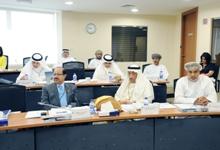
Typical street scene in Santa Ana, El Salvador. (Photo: iStock)
IMF Survey : IMF Opens Dialogue with Gulf Parliamentarians
April 30, 2014
- IMF hosts outreach to exchange views with parliamentarians from Gulf countries
- Goal is to improve understanding of IMF’s role in the region
- Focus on the region’s economic prospects, reforms needed to spur growth and jobs
The International Monetary Fund (IMF) provides a forum for parliamentarians from member countries of the Gulf Cooperation Council (GCC)—Bahrain, Kuwait, Oman, Qatar, Saudi Arabia, and United Arab Emirates—to exchange views on the Fund’s role and the economic issues facing the region.

IMF reaches out to Gulf parliamentarians to exchange views on the Fund’s role and the economic issues facing the region(photo: IMF)
Gulf Parliamentarians
Held during April 28-29 at the IMF Middle East Center for Economics and Finance (CEF) in Kuwait City, the two-day seminar aimed to foster greater understanding of the IMF’s role and familiarize participants with the macroeconomic analysis and policy tools underpinning its core policy consultations and programs, says IMF.
“Outreach to parliamentarians is important because they have a role to play in discussing economic legislations in their countries,” says Raja Almarzoqi, advisor in the IMF’s Middle East Department. The dialogue with them provides an opportunity to learn more about their views and concerns, explain the IMF policy advice, and discuss policy trade-offs their countries face,” he added.
Discussions with Gulf parliamentarians
The workshop combined presentations by IMF staff and case studies and was conducted in an interactive style. Discussion topics revolved around regional and global economic prospects, reforms to strengthen private sector growth and employment, challenges in energy subsidy reform, economic diversification, policy choices in managing natural resource revenues, monetary and exchange rate policies, and data issues.
They asked questions including on the role of the IMF and its governance structure, the future of economic diversification in the Gulf region, preconditions for monetary unions, and the role of monetary policy in growth and employment. Some participants stressed out the importance of female labor participation in the economy as well as the need to address issues in the informal sector and enable environment for the small-and-medium sized enterprises to flourish—topics that the IMF has also been advocating for.
Participants welcomed the opportunity to exchange views on regional economic issues with IMF staff and fellows from other GCC countries. Latifa Alqoud from the Bahraini Parliament noted that discussions were upbeat with participants interacting and asking many questions to seek clarifications on the Fund’s role and its policy recommendations.
They also considered this kind of outreach vital to their parliamentary work. “The workshop was useful and helped clarify lots of important issues, which will have positive implications as legislations get discussed at parliaments,” said Saad Mareq, Head of the Financial Affairs Committee at the Shoura Council in Saudi Arabia. In the same vein, Hameed Ben Salem from the Federal National Council in the United Arab Emirates agreed on the usefulness of the seminar and the importance of the topics discussed. He suggested ideas to enhance the organization of future events.
Some participants asked if the 188-member international organization can further step-up outreach to parliamentarians from the region. “Members of parliaments enriched the discussions and we hope that the IMF can organize similar outreach, especially for individual countries in the region,” said Ali Albadi, Deputy Chairman of the Economic and Financial Committee at the Shoura Council in Oman.
Dialogue helps IMF understand and explain
The IMF has been expanding its dialogue with legislators all over the world to improve the understanding of the political and social context in which economic decisions are made, and to help build understanding of the rationale for IMF advice. As an example, the IMF, in collaboration with the Parliamentary Network on the World Bank and International Monetary Fund, brought together parliamentarians from donor countries and Sub-Saharan African nations for meetings this week in Dar Es Salam, Tanzania, and a similar country specific seminar was just held in Mozambique last week.
“The IMF is committed to transparency in its work, to explaining itself, and to listening to the people whose lives it affects,” says Tim Callen, Division Chief at the IMF’s Middle East Department and Mission Chief for Saudi Arabia.
Parliamentarians can also play a wider advocacy role by raising awareness and fostering informed debate about the workings and benefits of governments’ economic policies. For these reasons, it makes sense for the IMF to engage with them and provide them with accurate, up-to-date information about the Fund, its operations, and policy advice, IMF says.
“This seminar targeted to parliamentarians as well as other outreach and training events geared to the media and civil society broadens our engagement with stakeholders beyond the traditional government, says Philippe Karam, Acting Director of the CEF. The Center has trained over 3000 government officials from 22 Arab countries since May 2011and has been able to increase sharply the training of participants from Kuwait and other Arab League countries,” he added.


